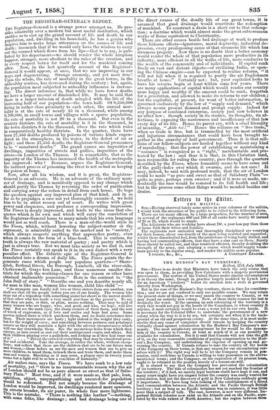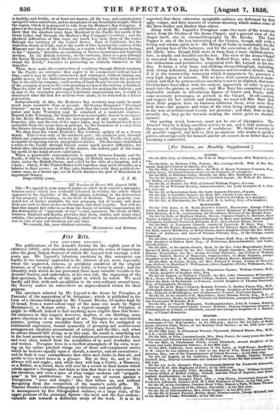THE HUDSON'S BAY TERRITORY.
Belfast, 27th Tuly 1858. Sin—There is no doubt that Ministers have taken the only course that was open to them, in providing New Caledonia with a despotic provisional government. The system of the United States under similar circumstances is in theory the same, though in practice largely modified by Lynch law; for an American " territory " before its erection into a state is governed directly from Washington. But in the ease of the Hudson's Bay territory, there is time for considera- tion; and we are not confined to only one possible course. We may retain the present state of things, or we may annex the country to Canada, or we may found an entirely new colony. Now, of these three courses the last is decidedly the worst. If the opening up and colonizing of the territory is a work that would not pay in the hands of the Canadians, to whose country it adjoins, it most certainly would be even a worse job in our own hands. It is necessary for the Colonial Office to undertake the government of a new colony when the way to it is by sea, but certainly not when it is the back- ground of an old and prosperous colony. At the same time, it is most unde- sirable that any cause of complaint should remain by keeping the country virtually closed against colonization by the Hudson's Bay Company's mo- nopoly. The most satisfactory arrangement by far would be the annexa- tion of the country to Canada, at least so much of it as can possibly be available for colonization. But it b said that Canada will not take the gift of it, on the very reasonable conditions of paying compensation to the Hud- son's Bay. Company, and undertaking the expense of opening up and go- verning the country. If Canada refuses to take the country off the hands of the Company on these terms, is that any reason for our encumbering our- selves with it ? The right way will be to let the Company. remain in pos- session, until such time as Canada is willing to take possession on the above- mentioned terms; and the Company, on the expiration of its present lease, ought to be retained in the position merely of a tenant-at-will. It is absurd to say that the Company has prevented the colonization of its territory. The tide of colonization has not yet reached the frontier of the territory; if it had, no merely legal bathers could have kept it out, and. many years might have yet elapsed before the country was really wanted for colonization had not the discovery of gold in New Caledonia suddenly !Riven it importance. We have long been talking of the establishment of a direct land communication between the Atlantic and the Pacific through British territory; but so long as no Pacific terminus was in existence it was little more than a subject of talk. The case, however,. is now very different. Im- portant British colonies now exist on the Atlantic and on the Pacific, sops. rated by the wide extent of North America; but the region between them is healthy and fertile, or at least not barren, all the way, and contain ninny navigable lakes and rivers, and no mountains of any formidable height. This is the region which it is proposed to take from the Hudson's Bay Company. A glance at the map of North America, or, still better, at the globe, is sufficient to show that the shortest mute from Montreal to the Pacific lies north of the Great Lakes and through the Hudson's Bay Company's territory ; and the physical difficulties of this route are much less than those of the routes through the territory of the United States. East of California lies the 'waterless desert of Utah ; and to the north of this, between the sources of the Missouri and those of the Columbia, is a region which Washington Irving, in his "Astoria," describes as consisting of barren mountains and frightful ravines. In the British territory, on the contrary, there is a pass through the Rocky Mountains which Sir George Simpson, m his "Overland Journey round the North," describes as presenting no obstacle 'whatever to the traveller.
These facts make the construction of a railway through British territory to the Pacific an enterprise that ought to be commenced without loss of time ; and it may be easily commenced, and continued, without risking any pnblie money., by the American system of granting lands along the proposed line to the railway company; each section of land should become the property of the company so 300II as the corresponding section of the railway is finished. Thus the sales of land would supply the funds for making the railway; and in case of the enterprise proving a hopelessly unpromising one, it could be abandoned after the first few sections were made, to be resumed in a future generation. Independently of this, the Hudson's Bay territory may easily be made much more accessible than at present. Sir George Simpson's " Overland Journey" seems to use to contain proof that the route between Lake Su- perior and Lake Winnipeg may be canalised at a moderate expense. Beyond Lake Winnipeg, the Saskatchewan is navigable almost to its source in the Rocky Mountains, with the interruption of only one rapid. Lake Superior, also, and the rest of the upper lakes' may be rendered much more accessible from the ocean than at present, by the formation of a canal from the Ottawa through Lake Aipissing to Lake Huron.
We often hear the whole Hudson's Bay territory spoken of as a frozen desert. This is true only of the northern part ; the southern part, through which any communication between the Atlantic and the Pacific must pass, is capable of ripening wheat, and produces timber. The Russians established a route to the Pacific through Siberia under much greater difficulties, for before they obtained possession of the Amoor, the eastern part of the route lay north of the limit of corn cultivation.
When a practicable communication is opened between Canada and the Pacific, it will be time to think of uniting all British America into a single state, under the British Crown, and called by the title of a kingdom not a colony ; which, if the United States hold together, may serve hereafter as a balance to their power; or, if they ruin themselves with their political ex- cesses, may, in a future age, act in North America the part of Macedonia in degenerate Greece.



































 Previous page
Previous page